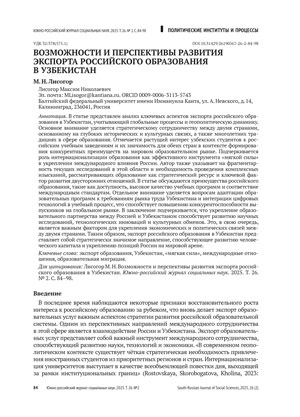Аннотация
В статье представлен анализ ключевых аспектов экспорта российского образования в Узбекистан, учитывающий глобальные процессы и геополитическую динамику. Основное внимание уделяется стратегическому сотрудничеству между двумя странами, основанному на глубоких исторических и культурных связях, а также многолетних традициях в сфере образования. Отмечается растущий интерес узбекских студентов к российским учебным заведениям и их значимость для обеих стран в контексте формирования конкурентных преимуществ на мировом образовательном рынке. Подчеркивается роль интернационализации образования как эффективного инструмента «мягкой силы» в укреплении международного влияния России. Автор также указывает на фрагментарность текущих исследований в этой области и необходимость проведения комплексных изысканий, рассматривающих образование как стратегический ресурс и ключевой фактор развития двусторонних отношений. В статье обсуждаются преимущества российского образования, такие как доступность, высокое качество учебных программ и соответствие международным стандартам. Отдельное внимание уделяется вопросам адаптации образовательных программ к требованиям рынка труда Узбекистана и интеграции цифровых технологий в учебный процесс, что способствует повышению конкурентоспособности выпускников на глобальном рынке. В заключение подчеркивается, что укрепление образовательного партнерства между Россией и Узбекистаном способствует развитию научных исследований, технологических инноваций и культурных обменов. Это, в свою очередь, является важным фактором для укрепления экономических и политических связей между двумя странами. Таким образом, экспорт российского образования в Узбекистан представляет собой стратегически значимое направление, способствующее развитию человеческого капитала и укреплению позиций России на мировой арене.
Ключевые слова
Библиографические ссылки
Арефьев, А.Л. (2021). Русский и мировые языки в зеркале статистики. CARTA Research Journal. Articles and Abstracts from the 23rd Conference, 7, 13–20.
Арефьев, А.Л. Шереги, Ф.Э. (ред). (2020). Экспорт российских образовательных услуг: статистический сборник. Москва: Министерство образования и науки РФ.
Арефьев, А.Л., Шереги, Ф.Э. (2015). Миграция кадров российской науки в академической и вузовской среде. Социология образования, 8, 25–40.
Бобыло, А.М. (2016). Стратегия развития российского образования как фактор обеспечения национальных интересов РФ в Азиатско-Тихоокеанском регионе. Азиатско-Тихоокеанский регион: экономика, политика, право, 18(3), 39–54.
Галичин, В.А. (2013). Международный рынок образовательных услуг: основные характеристики и тенденции развития. Век глобализации, 2, 101–112.
Дмитрий Чернышенко встретился с Президентом Республики Узбекистан Шавкатом Мирзиёевым. Режим доступа https://edu.gov.ru/press/9023/dmitriy-chernyshenko-vstretilsya-s-prezidentom-respubliki-uzbekistan-shavkatom-mirzieevym
Зиядуллаева, Л.Н. (2006). Внешнеэкономические связи Республики Узбекистан в условиях глобализации и регионализации мирового хозяйства (кандидатская диссертация). Москва.
Краснова, Г.А. (2021). Основы экспортной деятельности в сфере образования. Москва: Проспект.
Мажинов, И.Ш. (2007) Миграционный обмен России и стран Центральной Азии (кандидатская диссертация). Москва
Мещеряков, К.Е. (2007). Российско-узбекские межгосударственные отношения в 1991–2007 гг.: основные тенденции и проблемы развития (кандидатская диссертация). С-Пб: СПбГУ.
Нишанов, Д.Б. (2008). Внешняя политика Республики Узбекистан: в 90‑е годы XX века (автореферат кандидатской диссертации). М.: РУДН.
Образовательное пространство будущего: диалог России и Узбекистана. Режим доступа https://www.hse.ru/news/edu/936847402.html
Павлов, П.В., Защитина, Е.К. (2021). Экспорт высшего образования: прикладное исследование. Ростов-на-Дону: Изд-во Южного федерального ун-та.
Романчук, Е.С. (2025). Внешнеэкономические связи Республики Узбекистан: основные тенденции развития и перспективы взаимодействия с Россией (кандидатская диссертация). Москва.
Савичев, Ю.Н. (2016). Отношения России с Центрально-Азиатскими странами СНГ в гуманитарной сфере: 1991–2015 гг. (кандидатская диссертация). Москва.
Саидов, М.Х. (2001). Экономические основы государственной политики высшего образования в Республике Узбекистан (докторская диссертация). Москва.
Система высшего образования в Узбекистане. Режим доступа https://www.edu.uz/ru/pages/undergraduate-education#gsc.tab=0
Скоробогатова, В.И. (2020). Обучение иностранцев в России: от «мягкой силы» к экспорту образования. Образование и право, 5, 165–173. DOI: 10.24411/2076-1503-2020-00304
Торкунов, А.В. (2012). Образование как инструмент «мягкой силы» во внешней политике России. Вестник МГИМО–Университета, 4(25), 85–92.
Трансформация систем высшего образования стран Центральной Азии: новые возможности и вызовы для экспорта российского образования. Режим доступа http://rscf.ru/project/23-78-10036/
Троицкий, Е. (2024). Интернационализация высшего образования в Центральной Азии и роль России. Режим доступа https://russiancouncil.ru/analytics-and-comments/analytics/internatsionalizatsiya-vysshego-obrazovaniya-v-tsentralnoy-azii-i-rol-rossii/
Узбекистан и Россия расширяют кооперацию в сфере высшего образования. Режим доступа https://www.tatar-inform.ru/news/uzbekistan-i-rossiya-rassiryayut-kooperaciyu-v-sfere-vyssego-obrazovaniya‑5951791
Шереги, Ф.Э. (2015). Категориальная модель социологии образования. СОТИС — социальные технологии, исследования, 2(70), 37–50.
Abdurakhmanov, K.K., Khakimov, N.K., Ruzieva, R.H., Makhmutkhodjaeva, L.S., Tozhaliev, A.A. (2019). Higher Education as a Significant Factor of Uzbekistan’s Sustainable Development. Espacios, 9(40), 1–6.
Alimukhamedov, F. (2020). The Internationalisation of Higher Education in Uzbekistan: Some Thoughts about Uzbek Student Mobility and Spatial Distribution of Research Cooperation. Annals of the University of Bucharest. Political Science Series, 22(1–2), 61–88.
Honorati, M., Marguerie, A. (2021). Youth Employment in Uzbekistan. Opportunities and Challenges. Washington: International Bank for Reconstruction and Development.
Khoshimov, U.K. (2019). Mutual Relation between Uzbekistan and the Russian Federation in the Sphere of Higher Education. Researh Result. Social Studies and Humanities, 5(1), 98–103.
Killick, D. (2015). Developing the Global Student: Higher Education in an Era of Globalization. Milton Park, Abingdon, Oxon: Routledge.
Knight, J. (2014). International Education Hubs: Student, Talent, Knowledge-Innovation Models. Dordrecht: Springer.
Kudryashova, D., Rozhkova, Z., Mayorova, M. (2023). Russian-Uzbek Relations: State and Prospects. Russia and New States of Eurasia, 2, 178–188.
Makhmutkhodjaeva, L.S., Talipova, N.T., Isoxojaeva, M.Y. (2020). Interaction between the Republic of Uzbekistan and the Russian Federation in the Field of Science and Education in the Context of the innovative culture formation. Espacios, 44, 236–249.
Oliy ta’lim. Retrieved from https://stat.edu.uz/
Paterson, R. (2019). From Employment to Employability: Uzbekistan and the Higher Education Skills Agenda. Silk Road: A Journal of Eurasian Development, 1(1), 1–22.
Rostovskaya, T.K., Skorobogatova, V.I., Kholina, V.N. (2023). Problems and Prospects of the Online Model for Exporting Russian Education in the Context of Digital Inequality. Changing Societies & Personalities, 3(7), 65–81.
Semyonov, A. (2020). In Search of a New Sympoiesis: A Review of Higher Education Admissions in Uzbekistan. FIRE: Forum for International Research in Education, 3(6), 1–18.
Shishkov, V.V. (2023). State Policy of the Russian Federation on attracting foreign students of 2008–2021. Power and Administration in the East of Russia, 3(104), 137–146.
Warren, M. (2022). A Cold Winter Ahead. Confronting the Energy Crisis. Regional Economic Prospects, 28 September. Retrieved from https://www.ebrd.com/news/2022/reduced-gas-supplies-and-inflation-to-slow-growth-further-in-ebrd-regions.html
Which Academic Programmes are Most Popular among Uzbeks Attending Russian Universities? Retrieved from https://buzb.uz/en/news/which-academic-programmes-are-most-popular-among-uzbeks-attending-russian-universities
Wit, H. de, Knight, J. (1999). Quality and Internationalisation in Higher Education. Paris: Organisation for Economic Co-operation and Development.
Wit, H. de. (2017). The Globalization of Internationalization: Emerging Voices and Perspectives. London: Routledge.
Zashikhina, I.M., Griva, O.E. (2024). Evaluating the Impact of Short-term Russian Language and Culture Programmes on Adult Learners. Training, Language and Culture, 4, 71–58.


